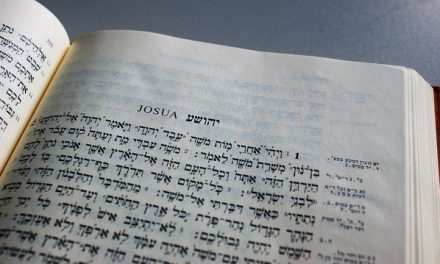It was such a beautiful moment and it moves me almost every time I read it. Three tribes (actually two and a half but we’ll say three) of Israel wanted to settle on the east side of the Jordan. They were accused of not wanting to support their brothers and trying to discourage them (Num 32) to the full obedience of the Lord.
These three tribes adamantly denied that was the case, and promised they would fight for all their brothers. In fact, they would leave the fighting and return home until all was accomplished. Moses accepted their Word.
And then in Joshua 22 we read that they had completely fulfilled it. They lead the way, did not desert their brothers, and fulfilled every command that Moses and the Lord required. Now Joshua, who was leading them, released them fully from their commitment.
“Now that he has given your brothers rest, just as He promised them, return to your homes in your own land that Moses the LORD’s servant gave you across the Jordan. Only carefully obey the command and instruction that Moses the LORD’s servant gave you: to love the LORD your God, walk in all His ways, keep His commands, remain faithful to Him, and serve Him with all your heart and all your soul (Jos 22:5).
It was a tender moment. These tribes hadn’t left early even though they sorely missed their wives and children back home. But they kept their commitment and were not blessed to return home.
The Brewing of a Civil War
On their way home, they stopped and built “a large, impressed altar there by the Jordan” (Jos 22:10). Their intentions were pure but the other tribes thought otherwise. Thinking that these tribes wanted to bring offerings and sacrifices there and disobey the Lord would have been no small offense. So they gathered together en masse to go to war against these three tribes.
Prior to engaging in battle, they sent delegates to the three tribes to find out why they had the audacity to build an altar.
“What is this treachery you have committed today against the God of Israel by turning away from the LORD and building an altar for yourselves, so that you are in rebellion against the LORD today? Wasn’t the sin of Peor, which brought a plague on the LORD’s community, enough for us, so that we have not cleansed ourselves from it even to this day, and now you would turn away from the LORD?…Wasn’t Achan son of Zerah unfaithful regarding what was set apart for destruction, bringing wrath on the entire community of Israel? He was not the only one who perished because of his sin (Jos 22:20).
The Israelites were still walking with a limp. The two events of sinning at Peor and the sin of Achan were wounds that were still raw. Even 5+ years after the fact. The results of these sins were still being felt.
So much so that when the Israelites thought the three tribes were going against the Lord, they rallied to go to war against their own people. They wanted nothing to do with sin in the community any more.
What was the sin of Peor?
This was when Balaam, the diviner hired to curse Israel but instead blessed them, incited the women of the land to sexually seduce and lead astray the Israelites. Further more they worshipped the “Baal of Peor” (Num 25:3), a god condoning sexual sin “for worship.” And their sin was not light. Beastiality, brazen immorality (Num 25:6) and all sorts of sexual perversion. The Scripture describe this as the Midianites who “attacked them with treachery” (Num 25:18).
Because of the sin of the Israelites, a plague broke out (Num 31:16) killing 24,000. The result was then that the men who followed the Baal of Peor had to be put to death (Num 25:1-5; Deut 4:3) to stop the plague.
It got worse.
Moses commanded the people to gather together and war against the Midianites. So 1000 fighting men from each of the 12 tribes went to war against Midian and won. Sounds good, except that they defied Moses’ orders and brought back all the women and children.
When Moses saw that they kept alive the women and children, he was furious. He asked them why the allowed the women to live as they were the ones who with Balaam’s instruction deceived and seduced the Israelites which brought about the plague (Num 31:14-18).
So in one of the hardest events in the Bible, Moses commanded all the women who had been with a man, and all the male children to be killed. The young girls could be saved. (More on this here).
It was perhaps the most horrible incident in all of Scripture. It is even referred to as the “the incident at Baal Peor” (Num 31:16). And perhaps there was some residual plague issues that it is said “that we have no cleansed ourselves from it even to this day” (Jos 22:17).
The plague took 32,000 men of Israel, they had to look Midianite women and their sons in the face and execute them, and the plague still had residual effects. To say it was a painful lesson was an understatement. Many of those men were their friends, family and brothers. And the women and sons…
What was the Incident of Achan?
Achan’s sin was still also bitter in their mouth. Riding high on their first victory against Jericho, they went and attacked a small town of Ai. The people of the town absolutely routed Israel, killing 36 men and chasing them back. Israel was bewildered and devastated (Jos 7).
Upon further investigation, it was found that Achan had sinned against the Lord at Jericho, taking that which was forbidden. Because of sin in the camp, the Lord did not support the Israelites (see more here).
While “only” 36 were killed, it was still 36 men that they knew and loved. Not only that but they had to face even a more uphill battle fighting other tribes who were temporarily encouraged by the success of the men of Ai.
This too was a wound. Perhaps not as devastating as the Peor Incident but it still was bitter in their memory. The Lord had removed his presence from assisting them, making them vulnerable to their enemies.
Back to the Reubenites, Gadites and Half Tribe of Manasseh
It was for these wounds still raw that when the greater number of tribes of Israel heard that the three tribes had built an altar, they gathered together to make war against them. But after a conversation, it became apparent that the three tribes were not acting in rebellion, but acting honorably.
They built the altar not to offer sacrifices, but rather to be a witness that they too were included in the worship of God in the land of Israel. It was meant to be a good thing.
After they talked with the tribes, the people and leaders were pleased with the three tribes. They returned to their homes and civil war was abated.
The Wound in their Hearts
It’s powerful to see how deeply the Israelites at this point were committed to obedience to the Lord, even willing to fight their own brothers. They had learned the hard way what it was and the price to pay to act in rebellion to the Lord. They were a covenant people with God and it was no small matter.
On the other hand we see that they were still carrying the wounds of disobedience. The plague at Peor and the sin of Achan was still a hurt in their hearts. But isn’t that always the case?
Last night I was scrolling through emails and deleting them. It was without a wound as I could see how in my desperation of the last few years, I had tried so valiantly to work my own miracle of deliverance. It failed miserably and I hurt many people unintentionally. It makes me want to bow my head. It wasn’t immorality, but it was still a heart ache and a credibility loss.
The one thing we can do is learn from our sins. That doesn’t mean we become legalistic like the Jews eventually did, trying to make a zillion little laws so as not to break a “big” law of God. But that we learn. We reach out to the Lord in faith and stay the course. Sometimes the running the race of God is one with a limp. Even Jacob understood that.
But we still get up and run another day.
God is still a God of redemption.
There are still good things ahead.
The Lord forgives and heals.






